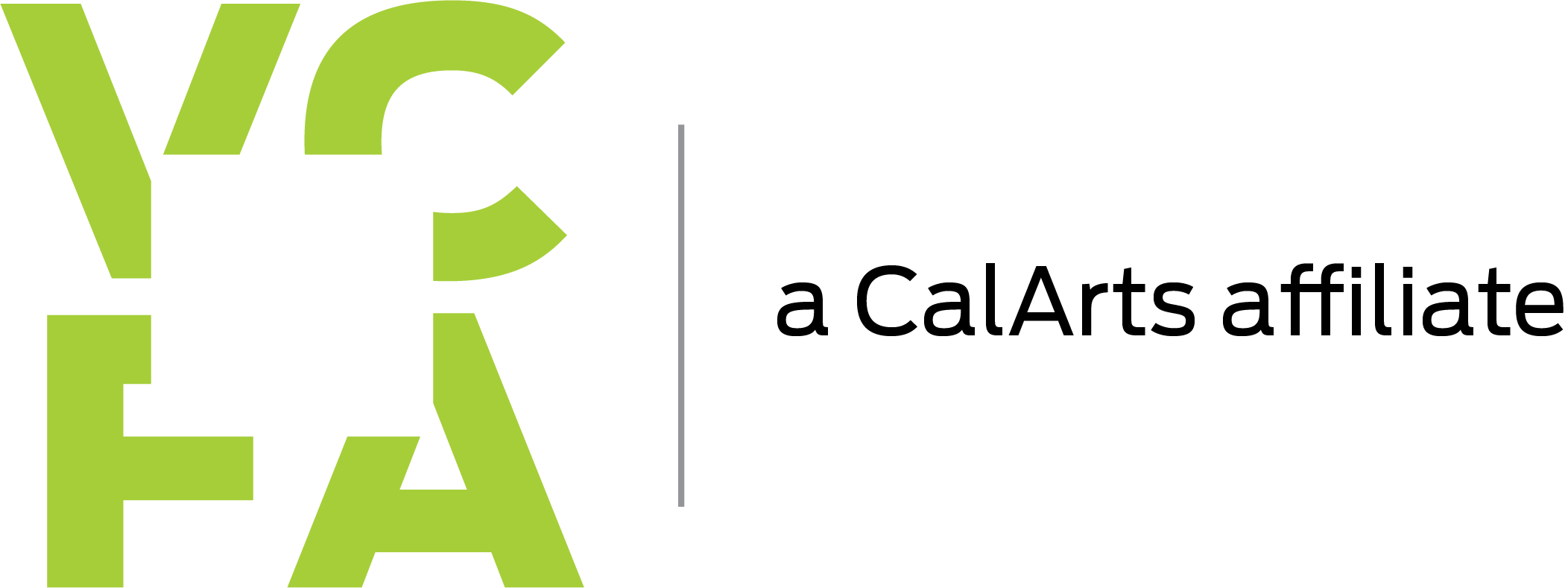Callie Newsom Doyle, 2024 MFA in Film
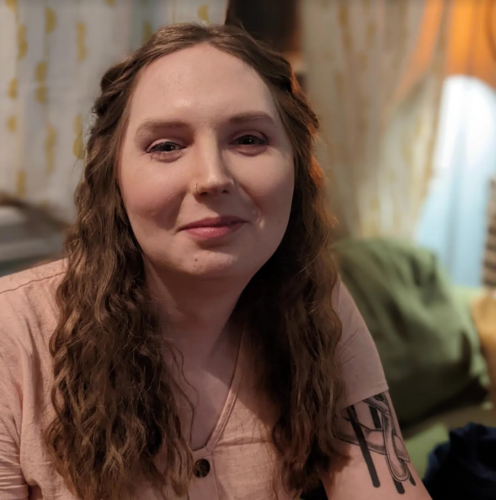 Meet filmmaker and class of 2024 Film candidate Callie Newsom Doyle, one of six recipients of our 2022 VCFA Center for Arts + Social Justice Fellowship Grant. The Center for Arts + Social Justice Fellowship Grant is a $2,000 one-time award available annually to one current student in each of our six MFA programs to support their work and/or practice at the juncture of arts and social justice.
Meet filmmaker and class of 2024 Film candidate Callie Newsom Doyle, one of six recipients of our 2022 VCFA Center for Arts + Social Justice Fellowship Grant. The Center for Arts + Social Justice Fellowship Grant is a $2,000 one-time award available annually to one current student in each of our six MFA programs to support their work and/or practice at the juncture of arts and social justice.
In the winter of 2023, we spoke with Newsom Doyle on her upcoming film series EXHALE—a portion of which was supported by the 2022 Center Fellowship. Read on for excerpts of our conversation and to learn more about EXHALE, the creation of the project, and the impact of working with the Center for Arts + Social Justice in Newsom Doyle’s own words
ON HER UPCOMING FILM SERIES, EXHALE
EXHALE is a series of four short (ish) films, and it’s about my mental state during each of the four seasons. So spring is a time when I’m relatively calm. It’s kind of the calm before the storm. [SPRING] is a really chill piece that is very meditative and peaceful. Then summer is usually when I’m at my worst, because this whole piece is kind of about healing from sexual trauma, and the cycle that it goes through, where every year when you get closer to the date, your mental state kind of starts getting worse. And so SUMMER is very aggressively dealing with that. It’s a series of four monologues told in the first person. Then FALL is kind of reactive to SUMMER. So it’s a very insular piece. FALL is about someone returning to a place of trauma and the experiences that brings up. And then WINTER. I’m so excited for WINTER because it is going to be this really beautiful piece of healing and embracing my trans identity and how that has helped me find healing through my sexual trauma. It’s probably the most experimental of the four pieces.
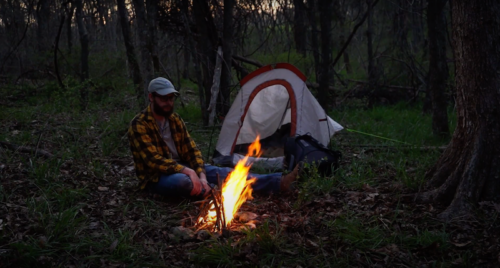
Scene from SPRING, courtesy of Callie Newsom Doyle.
ON CREATING THE FOUR SEASON FORMAT AND ALLOWING FOR THE PASSAGE OF TIME WITHIN FILM
I’m so fascinated with the passage of time. I’m constantly stressed about the passage of time. I’m very punctual. I have to be everywhere at the right time. I have to do XYZ in this amount of time. But when I do film, I’m the exact opposite. I love letting things breathe out. I find when you do that there are really beautiful accidents and moments. I realized [EXHALE] wouldn’t work as one piece. If you just have a one-off where you’re like, here’s a 70 minute piece where this person has this conversation and at the end of it all of a sudden they’re healed, that wouldn’t rain very true—even if within that piece it covers a year. It would just go too fast. And so I wanted to slow things down, bring it to a crawl in order to let you experience a year. And even though these shorts are mostly going to be 15 to 20 minutes long, I realized that [EXHALE] needed to be four discrete pieces that play off of each other and call back to each other but are unique, and that allow for passage of time to be clearly felt. Otherwise, you’re not going to understand that, one, this is a long process, and two, it’s unfortunately an emotional cycle. And that’s the big thing I want to drive home is that this is a huge cycle.
The reason it’s titled EXHALE is because at the very start of the movie I’m going to have a title card that says “Big breath in.” Last thing that will be shown is “Exhale.” And so it’s just like saying, “Hey, we got through a year.” It’s this supportive way to encourage my audience to be like, “We’re going to go through some shit, but at the end of the day, it’s going to be okay, these are just movies.”
ON THE VULNERABILITY OF EXHALE AND HER HOPES FOR AUDIENCE IMPACT
[When experiencing EXHALE], vulnerability is something that I really hope rings true with people and will help them kind of think about things a little bit differently… I showed SUMMER at my last VCFA residency and a couple of people walked up to me and they were like, “I related so hard to this. It meant so much to hear these stories and I felt seen for the first time in I don’t know how long.”
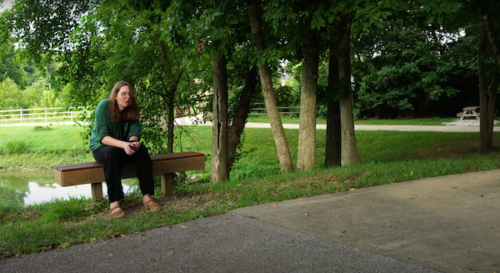
Scene from SUMMER, courtesy of Callie Newsom Doyle.
That moment reinforced why I need to do this. In SUMMER, I very explicitly call out that no one wants to hear someone talk about sexual trauma. This forces people who watch [EXHALE] to think about it and engage with it. At least that’s my hope. I don’t have delusions of grandeur where everyone’s going to watch this and it’s going to change everything. But I’m hoping that on a personal level for the small number of people that are going to see this… that this will impact someone to do research and say “Hey, this is something I experienced, and I’ve been really scared to talk about it.” Or they’ll research ways that they can help others. So my big hope for this is that it brings people together and creates a stronger sense of community outside of this film.
I ended [EXHALE] with a piece of acceptance and beauty. I could have totally easily ended this with SUMMER, and it would have been really powerful. It would have been painful. But I realized I wanted to end it softly to bring people back down to something that’s healing [WINTER]. We’ve gone through some really, really, really heavy material… and we’re going to end this at the moment of beauty and healing instead of with a moment of pain. I’m hoping that people will understand… things do get better. It’s hard. It takes forever to get better, and even if you fall back into your trauma and you have a relapse of your mental health, it’s okay. There’s no shame in it. It’s a cycle. And we just have to do things to just kind of slowly break the cycle.
ON SPEAKING TO THE QUEER COMMUNITY THROUGH EXHALE
I’m making a lot of this for queer people, and so my goal is to be there for queer people. My biggest hope for that communal goal is that people will start talking about it at the exhibition and that they’ll continue that conversation outwards, and maybe start sharing their own stories to be able to start the process of healing, because unfortunately, that’s the way to heal is to talk about it. So my big hope is that someone will see me on screen talking about mental health and sexual trauma and being like, “They can do it and I can do it.”
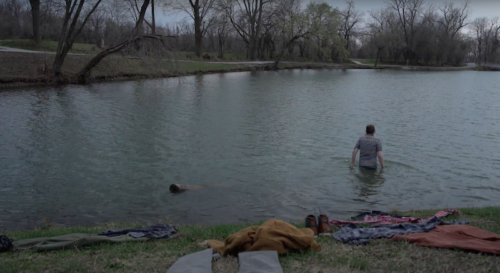
Scene from WINTER, courtesy of Callie Newsom Doyle.
WINTER is about my identity as a trans woman and how that has freed me. I’m hoping that for other trans people, they’ll see that this journey, accepting transness and embracing it fully, can be really beneficial—especially if you have gone through something similar. The acceptance of self and not blaming self is the most powerful thing that I’ve found.
ON THE IMPACT OF THE CENTER FOR ARTS + SOCIAL JUSTICE FELLOWSHIP
FALL could not have been shot without this grant. We had to pay for a lot of travel costs and this really helped pay for those, and it allowed me to use the crew and cast that I wanted to use… It is going to also allow me to do WINTER safely. It’s going to help save my life because WINTER involves me going into bodies of water in winter. I don’t say that as a joke. [This grant is] going to allow me to buy the things I need to buy in order to not get hypothermia.
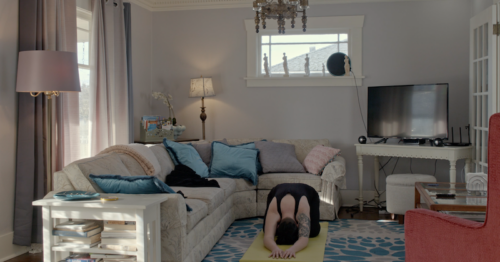
Scene from FALL, courtesy of Callie Newsom Doyle.
That’s the big way that the grant money has helped. And the fellowship, I mean, we’ve had one meeting, but that meeting was so inspiring. These [Center Fellows] are amazing… It’s just so inspiring to see other people and other mediums creating something that’s beautiful that I can never fathom. I love that.
Honestly, [the Center Fellowship] helps my self esteem. It means some people see value in this. It’s a reaffirmation that this is the right direction that I should be going in. That my efforts are not fruitless, that people are seeing what I’m doing and valuing it and it’s just very uplifting. I cried when I got the fellowship. I just was elated and I felt seen a way that I haven’t been in forever because people look over queer people. People really look over trans people. So to be seen by this program, and the way that I have been seen, was just so wonderful. It meant so much to me. I remember when I was accepted to [VCFA], I was going through and I read about this and I was like, “I want to be a part of this.” It was one of those things where I set this as a goal I wanted to do but I didn’t think I was going to achieve it and yet here I am having achieved it. It’s really wonderful and it just meant the world.
